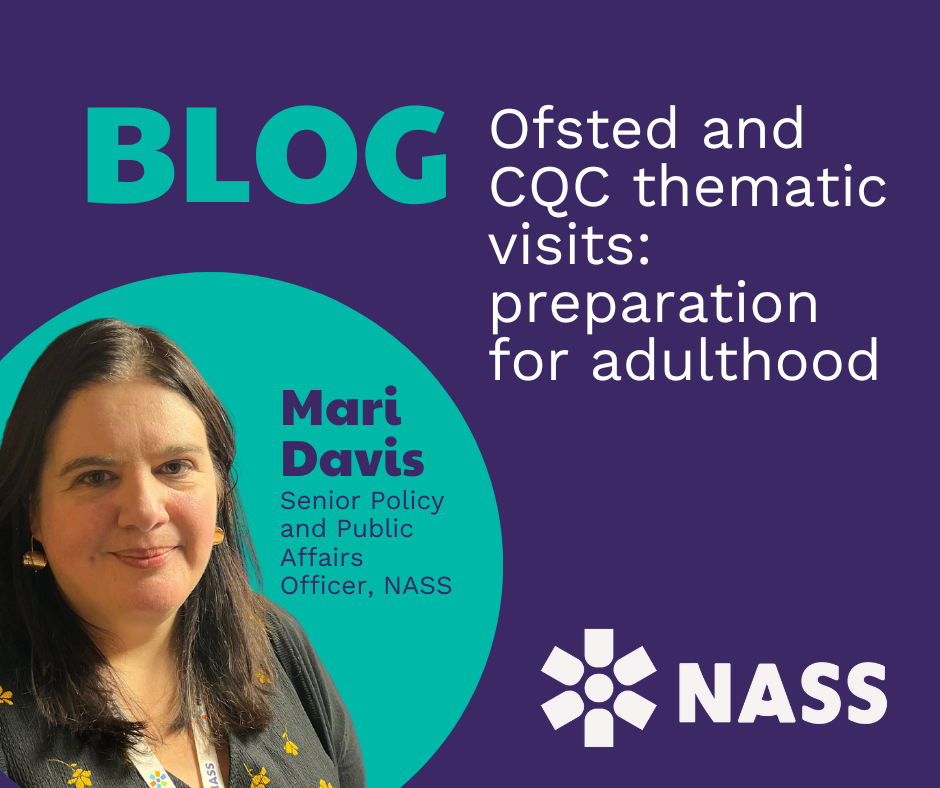 Navigating different parts of the government is without a doubt challenging, and there are days where it can only be described as frustrating!
Navigating different parts of the government is without a doubt challenging, and there are days where it can only be described as frustrating!
Monday was one of those days for me. Here’s why…
For some time now, we have been persistent in our efforts to penetrate the ironclad defences around the Change Programme Partnerships and gain valuable insight into what is going on in terms of the SEND review pilots. On Monday, I was yet again seeking to find ways to glean insights for our NASS members, when the new guidance around the Ofsted and Care Quality Commission thematic visits on preparation for adulthood landed on my desk.
These local thematic visits to a “small number of areas” will look at all phases of a child with SEND’s transition to adulthood, from early years settings through to post-16 education, to get a detailed overview of how preparation for adulthood arrangements is working.
The visits will not result in judgements about local areas, but the findings will be published in a report this autumn. The focus of the area thematic visit last year was around alternative provision and the report published on the 1st February cast a critical view that highlighted the lack of coherent partnership working across agencies and with providers, parents, children and young people.
The first listed purpose of this next tranche of thematic visits is to “find out the extent to which local area partners across education, health and social care are working together effectively”.
And here lies my great frustration.
The guidance states that the outcomes of the visits is to identify good practice in terms of joint working that can contribute to policy development through the SEND and alternative provision improvement plan. However, to date, our reality is that the piloting and testing of new policies and new ways of working are going on behind closed doors. There are layers of bureaucracy and secrecy, without any reference beyond initial promises of joint working, partnership and co-production.
During the proposed thematic visits, inspectors will explore factors that enable and/or prevent local area partners from working together to support children and young people with SEND to transition successfully through education into adulthood.
Our members need to be aware that although this is a local level thematic process, all types of education providers may be contacted as inspectors gather knowledge to help them understand how local area partners make sure that children and young people with SEND are prepared for the next stage of their lives.
The hope is that these inspections will shed light on the challenging transition stages. We often hear from colleagues that at these critical stages there needs to be better co-ordination across all stakeholders.
Hopefully the thematic review will also consider the impact of recent policies such as the financial interventions with LAs, lack of transparency in testing new ways of working and a shift from seeking to achieve the best possible outcome for children and young people to that of ‘good enough’ has on their future quality of life.
The “Reaching My Potential” report we published last year, commissioned from Sonnet Impact, provides compelling evidence of the lifelong value, both in financial and quality-of-life terms, when needs are met well and in a timely manner. If you have time, revisiting this report offers some valuable insights.
I look forward to the publication of the thematic review report in the autumn, and its findings in relation to how children and young people with SEND are supported to transition successfully through education into adulthood. I believe the value of these thematic visits lies not just in highlighting challenges, failures and good practice, but crucially in paving the way for more transparent, collaborative and child focused SEND system.